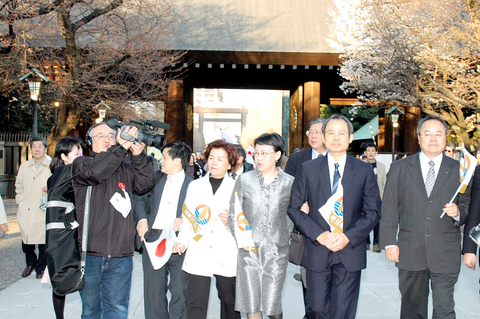After seeing some takes on the Yasukuni issue over at Japan Media Review Weblog, I figured I’d let my own organization, Fukuoka-based West Japan Daily (a typically liberal regional newspaper), put in their two cents in English:
On the subject of the Yasukuni visit issue, Prime Minister Koizumi is repeating the same old line of “I will decide appropriately when I go there.”
And to his critics, Japan and Korea, expresses his strong distaste: “It is not for other countries to interfere with a shrine visit that is derived from my own beliefs.”
If Mr. Koizumi were a mere denizen of Japan, no one could disagree with him. However, the Prime Minister is a public figure, the highest leader representing Japan. This problem won’t be solved just by insisting that no one can quibble with personal belief.
Why is visiting Yasukuni Shrine sparking such resistance from China and Korea? The PM should think more seriously about this as the representative of this country.
We also do not think that the recent anti-Japan protests in China are justified. Particularly, not apologizing after we forgave the anti-Japanese demonstrators for attacking a Consul General and the sudden cancellation and return of Vice Premier Wu’s meeting with Koizumi were, diplomatically speaking, extremely rude.
However, the enshrinement of A-class war criminals who led the Pacific War along with the war dead is at the root of China’s criticism of Koizumi’s visits.
Even looking at the first official visit to Yasukuni, made in 1985 by then PM Yasuhiro Nakasone but not made again after the next year, the decision was made to cancel further visits because considering Chinese criticism and not going to Yasukuni was seen as stabilizing the Sino-Japanese relationship and working in the Japanese national interest.
That same Nakasone said of Koizumi’s visits, “It is commendable to stick to one’s beliefs, but it is also important to think of how this affects the whole country’s interests.”
This is what we would like Koizumi to consider. Sticking to one’s own beliefs without listening to China’s criticism has a direct effect on the Japanese people’s interests.
The fact that Lower House Chairman Youhei Kono, who conferred with five former PMs, said to Koizumi on May 7 that based on the conference, “You should take the utmost care when considering visiting Yasukuni,” was yet another expression of crisis consciousness that worsening Sino-Japanese relations any more than they are would be detrimental to our interests.
Komeito head Takenori Kanzaki has also demanded a stop to the visits, saying, “If the visits continue this will have a bad effect on the basis for our coalition.”
The Prime Minister should understand more than anyone how important stable relations with China are. Despite this, he maintains the attitude that, “It is one of the PM’s roles to pay memorial tribute to the war dead enshrined at Yasukuni.” We understand his beliefs and feelings. That attitude is one reason why the PM enjoys stable popular support.
However, current popular opinion polls show that a majority of people think that “The PM should cancel his plans to visit Yasukuni Shrine.”
Koizumi can believe what he wants, but a Prime Minister’s job is to put a priority on breaking the current deadlock between Japan and China. That would not be a capitulation to China’s criticism in the slightest. Most Japanese would agree, I’m sure.
 Article 20 of the Constitution of Japan says that “freedom of religion is guaranteed to all. No religious organization shall receive any privileges from the State, nor exercise any political authority… The State and its organs shall refrain from religious education or any other religious activity.” Article 89 further states that “no public money or other property shall be expended or appropriated for the use, benefit or maintenance of any religious institution or association, or for any charitable, educational or benevolent enterprises not under the control of public authority.”
Article 20 of the Constitution of Japan says that “freedom of religion is guaranteed to all. No religious organization shall receive any privileges from the State, nor exercise any political authority… The State and its organs shall refrain from religious education or any other religious activity.” Article 89 further states that “no public money or other property shall be expended or appropriated for the use, benefit or maintenance of any religious institution or association, or for any charitable, educational or benevolent enterprises not under the control of public authority.”

